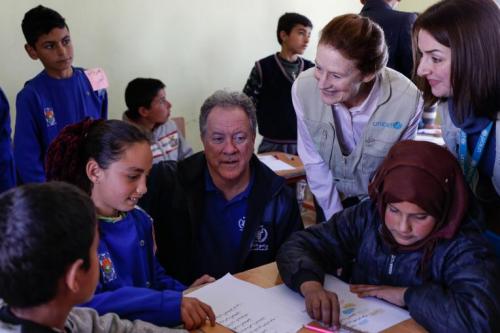UNICEF, WFP chiefs wrap up two-day visit to Syria, see impact of conflict on children and families
UN officials call for cessation of hostilities and protection of children as conflict is about to enter its 10th year
It is now more urgent than ever to end the violence in Syria and to improve access across the country, UNICEF Executive Director Henrietta Fore and World Food Programme Executive Director David Beasley said, on March 5. Wrapping up a two-day visit to the country, the two agency chiefs also stressed the need to provide families with basic services and to improve their economic conditions.

On 3 March 2020 in the Syrian Arab Republic, World Food Programme (WFP) Executive Director David Beasley (seated, centre) and UNICEF Executive Director Henrietta H. Fore (standing, second from right) visit with third grade children at Tal-Amara school in southern rural Idlib. The 9-year-old students have witnessed nothing but conflict, as they are the same age as the crisis. Many have not been able to enroll in formal education before. The school is the only elementary school in Tal-Amara village. With support from UNICEF, the school is providing 130 children with formal education and an accelerated learning programme (Curriculum B) for children who have missed out on years of education. The school is also part of WFP’s School Feeding Programme in the Sinjar subdistrict.
Their trip comes amid a dangerous escalation in northwest Syria and as the conflict is about to enter its 10th year, leaving one-third of the Syrian people food insecure, 1 in 3 children out of school, and over half of all health facilities non-functional.
“Children across Syria are enduring the impact of a merciless war and will continue to suffer long after the guns have gone silent,” said Henrietta Fore, UNICEF Executive Director. “Over the past 9 years, schools and hospitals have been bombed, families have been torn apart, and young lives have been lost. Even in areas far away from the frontlines, families are struggling to feed their children and rebuild their lives. For those responsible for this collective failure on Syria: History will judge you harshly.”
Nine years of war have left Syria’s economy in near collapse, pushing millions of people into hunger and food insecurity. Between 2018 and 2019, the number of food-insecure people increased from 6.5 million to 7.9 million, and food prices spiked by 60 per cent.
“The millions of people whose lives have been shattered by war can no longer afford to put food on the table as the Syrian economy has taken a nosedive in recent months,” said David Beasley, Executive Director of the World Food Programme. “WFP is providing food assistance to over 7.5 million people inside Syria and in the neighbouring countries who would otherwise be on their own. The war has left Syria a broken country and above all the people desperately need peace.”
During their trip, Fore and Beasley visited a school, a food distribution center and a health clinic in Sinjar, southern Idlib, 30 kilometers away from the frontline. They met nine-year-old schoolchildren who were born the year the war started and are catching up on their learning after years of missing out. They also visited a woman who lost her small business when the war forced her to leave her home and is now dependent on WFP assistance to feed her three young siblings who live with disabilities.
Further up north in Idlib, the situation of children and families has become even more critical: More than half a million children have been displaced in the past three months, an average of 6,000 a day. Some 180 schools are out of operation because they were either destroyed, damaged or used as shelter for displaced families. Food prices have increased by 120 per cent since last year.
Meanwhile, in the northeast, tens of thousands of children continue to languish in displacement camps, deprived of the most basic services, despite the significant efforts of humanitarian partners. Some 28,000 children from more than 60 countries, including 20,000 from Iraq, remain stranded in Al Hol camp, rejected by their governments and shunned by their communities.
In their meetings with government officials, Fore and Beasley renewed their agencies’ commitment to helping Syria’s most vulnerable children and families and providing them with education, nutrition, health, protection services and food.
They stressed that being able to move staff and supplies across conflict lines and across borders is critical for reaching the populations most in need, particularly as 11 million people in the country – 5 million of them children – require humanitarian assistance.
Source: United Nations Children's Fund
- 209 reads
Human Rights
Ringing FOWPAL’s Peace Bell for the World:Nobel Peace Prize Laureates’ Visions and Actions

Protecting the World’s Cultural Diversity for a Sustainable Future

The Peace Bell Resonates at the 27th Eurasian Economic Summit

Declaration of World Day of the Power of Hope Endorsed by People in 158 Nations

Puppet Show I International Friendship Day 2020

